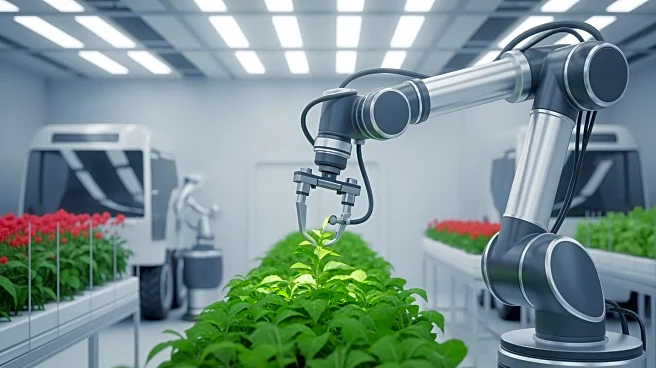What's Happening?
The fourth annual FIRA USA event, held from October 21 to 23, 2025, in Woodland, California, highlighted significant advancements in automation technologies for specialty crop agriculture. The event attracted
over 1,800 participants, including growers, equipment manufacturers, researchers, and investors. More than 60 exhibitors showcased innovations in agricultural robotics, with 30 robotic systems demonstrated live. Discussions focused on how automation can address labor shortages, economic pressures, and sustainability goals. The event emphasized collaboration between growers and technology developers across various sectors, such as tomatoes, sugarcane, fresh vegetables, leafy greens, vineyards, and tree nuts. Several commercial agreements were reportedly signed during the event. Notable product launches included John Deere's autonomous 5ML tractor and New Holland's precision automation tools. The California state government has invested approximately $30 million to support the California AgTech Alliance, a network aimed at scaling agricultural technology solutions.
Why It's Important?
The rise of automation in specialty crop farming is crucial for addressing labor shortages and economic pressures faced by the agriculture industry. Automation technologies can enhance efficiency and sustainability, potentially transforming the sector. The projected growth of specialty crop automation, from an estimated $250 million in 2024 to $1 billion by 2030, underscores its economic significance. The event's focus on collaboration between growers and technology developers highlights the importance of integrating new technologies into existing agricultural practices. The California AgTech Alliance's investment further emphasizes the state's commitment to advancing agricultural technology, which could serve as a model for other regions.
What's Next?
Organizers of FIRA USA plan to expand the event both nationally and internationally, with future editions under consideration in Washington State, Pennsylvania, Florida, and several European countries. This expansion aims to foster global collaboration and innovation in agricultural technology. The continued development and adoption of automation technologies are expected to create new opportunities in related services, such as data analytics and integration. As the industry evolves, stakeholders will likely focus on ensuring that these technologies are accessible and beneficial to growers of all sizes.









